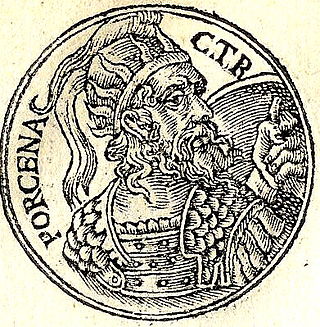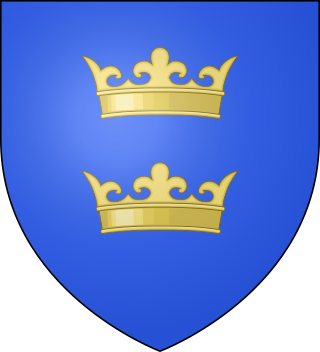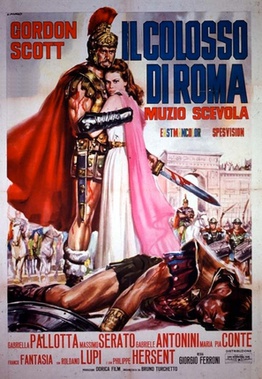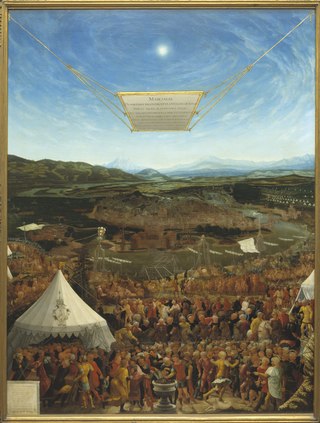
Lucius Tarquinius Superbus was the legendary seventh and final king of Rome, reigning 25 years until the popular uprising that led to the establishment of the Roman Republic. He is commonly known as Tarquin the Proud, from his cognomen Superbus.

Publius Horatius Cocles was an officer in the army of the early Roman Republic who famously defended the Pons Sublicius from the invading army of Etruscan King Lars Porsena of Clusium in the late 6th century BC, during the war between Rome and Clusium. By defending the narrow end of the bridge, he and his companions were able to hold off the attacking army long enough to allow other Romans to destroy the bridge behind him, blocking the Etruscans' advance and saving the city.

Gaius Mucius Cordus, better known with his later cognomen Scaevola, was an ancient Roman youth, possibly mythical, famous for his bravery.

Cloelia was a legendary woman from the early history of ancient Rome.

Lars Porsena was an Etruscan king (lar) known for his war against the city of Rome. He ruled over the city of Clusium. There are no established dates for his rule, but Roman sources often place the war at around 508 BC.

Belinus the Great was a legendary king of the Britons, as recounted by Geoffrey of Monmouth. He was the son of Dunvallo Molmutius and brother of Brennius. He was probably named after the ancient god Belenus.
Brennius was a legendary king of Northumberland and Allobroges, as recounted by Geoffrey of Monmouth. He was the son of Dunvallo Molmutius and brother of Belinus, probably based upon one or both of the historical Brenni.

Publius Valerius Poplicola or Publicola was one of four Roman aristocrats who led the overthrow of the monarchy, and became a Roman consul, the colleague of Lucius Junius Brutus in 509 BC, traditionally considered the first year of the Roman Republic.
Clusium was an ancient city in Italy, one of several found at the site. The current municipality of Chiusi (Tuscany) partly overlaps this Roman walled city. The Roman city remodeled an earlier Etruscan city, Clevsin, found in the territory of a prehistoric culture, possibly also Etruscan or proto-Etruscan. The site is located in northern central Italy on the west side of the Apennines.
Publius Mucius Scaevola was a prominent Roman politician and jurist who was consul in 133 BC. In his earlier political career he served as tribune of the plebs in 141 BC and praetor in 136 BC. He also held the position of pontifex maximus for sixteen years after his consulship. He died around 115 BC.

Sextus Tarquinius was one of the sons of the last king of Rome, Lucius Tarquinius Superbus. In the original account of the Tarquin dynasty presented by Fabius Pictor, he is the second son, between Titus and Arruns. However, according to Livy and Dionysius of Halicarnassus, he was either the third or first son, respectively. According to Roman tradition, his rape of Lucretia was the precipitating event in the overthrow of the monarchy and the establishment of the Roman Republic.

Muzio Scevola is an opera seria in three acts about Gaius Mucius Scaevola. The Italian-language libretto was by Paolo Antonio Rolli, adapted from a text by Silvio Stampiglia. The music for the first act was composed by Filippo Amadei, the second act by Giovanni Bononcini, and the third by George Frideric Handel. Collaborations of groups of composers were common in the 18th century, though this is the only one done in London. Bononcini had written the music for two earlier treatments of this story on his own, works dating from 1695 and 1710.
The Latin phrase cīvis Rōmānus sum is a phrase used in Cicero's In Verrem as a plea for the legal rights of a Roman citizen. When travelling across the Roman Empire, safety was said to be guaranteed to anyone who declared, "civis Romanus sum".
The Roman–Etruscan Wars were a series of wars fought between ancient Rome and the Etruscans. Information about many of the wars is limited, particularly those in the early parts of Rome's history, and in large part is known from ancient texts alone. The conquest of Etruria was completed in 265–264 BC.

The gens Mucia was an ancient and noble patrician house at ancient Rome. The gens is first mentioned at the earliest period of the Republic, but in later times the family was known primarily by its plebeian branches.
Spurius Larcius was one of the leading men of the early Roman Republic, of which he was twice consul. However, his greatest fame was won as one of the defenders of the Sublician bridge against the army of Lars Porsena, the King of Clusium.

Titus Herminius, surnamed Aquilinus, was one of the heroes of the Roman Republic. He participated in two of the most famous conflicts that attended the birth of the Republic, and was elected consul in 506 BC. However, his greatest fame was won as one of the defenders of the Sublician bridge against the army of Lars Porsena, the King of Clusium.

Hero of Rome is a 1964 sword and sandal film set in Rome in 508 BC, and depicts the expulsion of the last kings of Rome and the legend of Gaius Mucius Scaevola.

Horatius Coclès is an opera in one act and nine scenes by the French composer Étienne Nicolas Méhul with a libretto by Antoine-Vincent Arnault. It was first performed at the Paris Opéra on 18 February 1794. It is based on the Roman legend of Horatius Cocles.

Abraham Schöpfer was a German Northern Renaissance painter.














